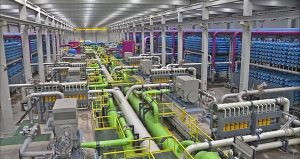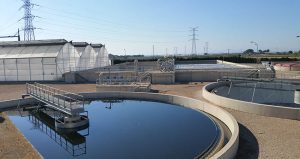Desalination research: Algae against brine pollution

-
 Fergal MacErlean
Fergal MacErlean
Share article:
New research shows that algae-based brine treatment offers a promising approach to fight against brine pollution. According to the paper this ‘not only reduces the environmental pollution impacts of brine discharge but also produces valuable biomass products’.
The Qatar University study which was published in Environmental Technology & Innovation in May and funded by the institution’s graduate assistantship program found that by harnessing the natural ability of microalgae to absorb and metabolize pollutants, this technology could become a promising solution for reducing the ecological impact of desalination plants. The authors of the research concluded that “through ongoing research and development, we can expect advancements in microalgal cultivation techniques, strain selection, and system optimization, leading to improved efficiency and effectiveness in remediating desalination discharge.”
Valuable byproducts
“This innovative approach also creates additional value by generating biomass for biofuel production and other valuable byproducts. As the field progresses, we can anticipate the integration of microalgal remediation as a standard practice within the desalination industry, contributing to a more sustainable and eco-friendly approach to water treatment. With continued research and development, this technology has the potential to become a standard practice within the desalination industry”, stated the researchers.
Mitigating brine impact
Microalgae culture offers an affordable and green approach coupled with the production of high-value biomass positioning them as a favorable technique for sustainable management of desalination discharge. These microbes could assimilate various nutrients, metal contaminants, and organic toxicants from the brines, thereby mitigating the impact of brine. The production of brine still is one of the major problems of desalination.
Algae against brine
The Quatar study also asserts that microalgae cultivation is a sustainable and cost-effective approach for wastewater treatment plants (WWTP’s) as microalgae have a great capacity to eradicate pollutants via several mechanisms. Furthermore, the paper states that the co-culturing of microalgae with other microorganisms enhances the efficacy of wastewater treatment plants.
Biofuel production
valuable compounds can be extracted from the processed biomass including lipids, carbohydrates, proteins, natural pigments, and antioxidants. Such compounds have great potential for different industrial applications including food and feed, cosmetics, and pharmaceuticals. Furthermore, the biomass generated post-treatment is considered renewable and sustainable feedstock for biofuel production like biodiesel, bio-hydrogen, and bioethanol. As a result, the utilization of microalgae to treat desalination brine holds the potential to become a significant, and cost-effective solution to sustainable management of brine, according to the authors of a June 2023 published study.















